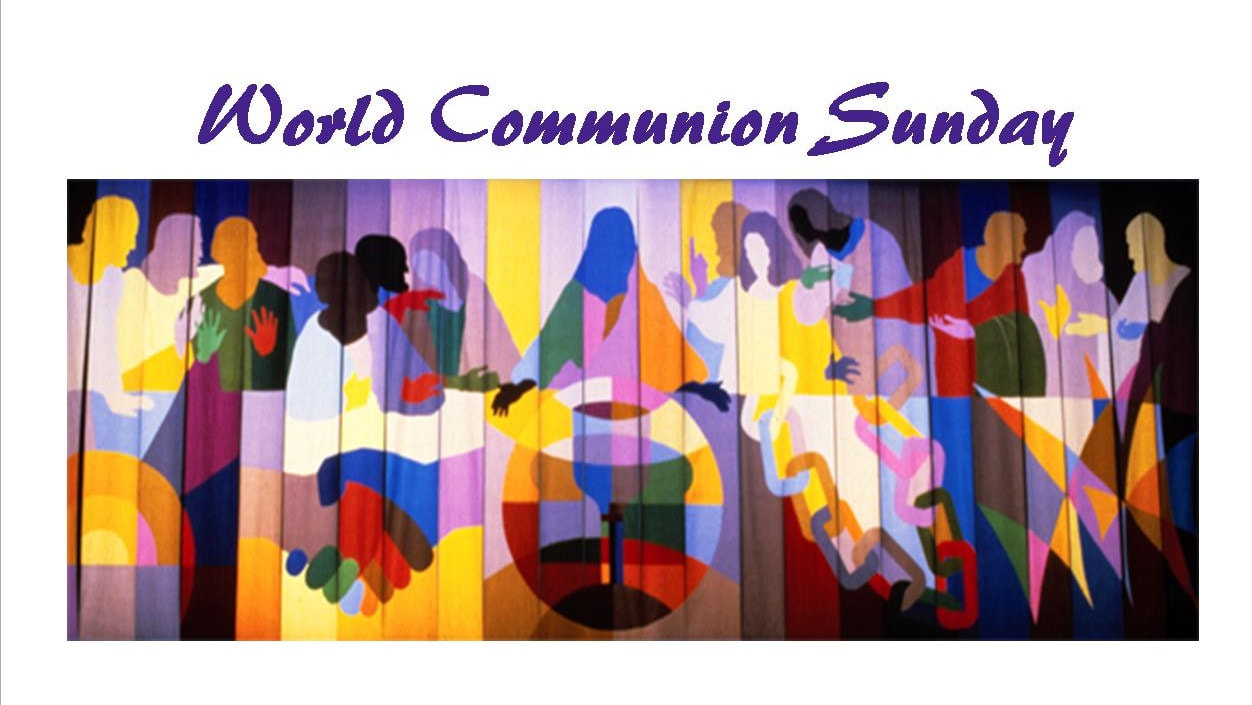
First Congregational Church of Cheshire
Sunday, October 20, 2019
© the Rev. Dr. James Campbell
Matthew 25:14-30
“For it is as if a man, going on a journey, summoned his slaves and entrusted his property to them; to one he gave five talents, to another two, to another one, to each according to his ability. Then he went away. The one who had received the five talents went off at once and traded with them, and made five more talents. In the same way, the one who had the two talents made two more talents. But the one who had received the one talent went off and dug a hole in the ground and hid his master’s money. After a long time the master of those slaves came and settled accounts with them. Then the one who had received the five talents came forward, bringing five more talents, saying, ‘Master, you handed over to me five talents; see, I have made five more talents.’ His master said to him, ‘Well done, good and trustworthy slave; you have been trustworthy in a few things, I will put you in charge of many things; enter into the joy of your master.’ And the one with the two talents also came forward, saying, ‘Master, you handed over to me two talents; see, I have made two more talents.’ His master said to him, ‘Well done, good and trustworthy slave; you have been trustworthy in a few things, I will put you in charge of many things; enter into the joy of your master.’ Then the one who had received the one talent also came forward, saying, ‘Master, I knew that you were a harsh man, reaping where you did not sow, and gathering where you did not scatter seed; so I was afraid, and I went and hid your talent in the ground. Here you have what is yours.’ But his master replied, ‘You wicked and lazy slave! You knew, did you, that I reap where I did not sow, and gather where I did not scatter? Then you ought to have invested my money with the bankers, and on my return I would have received what was my own with interest. So take the talent from him, and give it to the one with the ten talents. For to all those who have, more will be given, and they will have an abundance; but from those who have nothing, even what they have will be taken away. As for this worthless slave, throw him into the outer darkness, where there will be weeping and gnashing of teeth.’
+++
There was no one who was better at squirreling money away than my grandmother. As a child of the Depression, she remembered what it was like to be hungry. She told tales of living in a cave for a few months after an eviction. My grandmother hated antiques her whole life because, as she used to say, “They just remind me of the bad old days.”
Later on, life was much better for her. My grandfather owned a series of businesses and they lived a comfortable life. But that fear of not having enough always haunted her. And my grandfather, God love him, would spend money on one hair-brained scheme after another. And so, my grandmother, fearing a return to poverty, started to bury money – literally – in canning jars – in the back yard. Later, her operation became more sophisticated and she moved it inside.
She had a lot of bank bags, the cloth kind with the zipper that locks. She called these her “Biz Bags”, a reference to a laundry detergent commercial popular in the 1970s. She would stuff them full of cash and then hide them around the house. One of her favorite hiding places was the forced air heating ducts. She would lift the grates and push her biz bag down into the vents. And she would hide money in the freezer – calling that stash her “cold, hard cash.” And after each of these secrets was revealed to me, my grandmother would say: “Now don’t you tell your grandfather anything.” And then to be sure I kept my mouth shut; she would slip me a twenty.
At the end of her life, all of that money had run out. And I used to wonder if my grandmother would have had a lot more money at the end if she had only resisted the temptation to bury it instead of investing it. But the world is full of uncertainty and she knew that from hard experience. And so she looked for comfort in a canning jar and a heating duct and a freezer. We all look for comfort in different ways.
There’s a lot of my grandmother in me. I too like a so-called safe bet. I am, by nature, rather risk-averse. I don’t like to live on the edge of anything. And so stories like the one Jesus tells today makes me a little nervous.
Once upon a time, a rich man decided to go on a journey. And so, he called three of his most trusted servants and gave them huge sums of money to care for in his absence. To the one he gave 5 talents (about 4.2 million dollars in our world). To another he gave 2 talents (about 1.7 million). And to the other he gave 1 talent (about $840,000). The first two servants went off to Wall Street and invested all the money they had been given. But the third servant, fearing the fluctuation of the markets, got out a canning jar, dug a very deep hole under the cover of darkness and buried his master’s money in the back yard.
As luck would have it, the first two servants invested in a bull market. Over time, they doubled their master’s money. Servant #1 now had 8.4 million dollars and servant #2 now had 3.4 million dollars. They took a risk and it paid off handsomely. Servant #3 had not doubled the money, but he had not lost any either. And for lots of us risk-averse types, that seems pretty good. In lots of churches nowadays, which are pretty risk-averse institutions, that seems pretty good.
After a lot of time had passed, the master returned home and called his servants in for an accounting. Servant #1 proudly announced: “Sir, I have doubled your money!” “Great job, good and faithful servant, you’re getting a big promotion. And here’s a key to the Executive Club!” Servant #2 proudly announced that he too had doubled the money. “Great job, good and faithful servant, you’re also getting a big promotion. And here’s you’re key to the Executive Club!” Then it was #3’s turn. He was feeling pretty good too. “Well, sir,” he began, “I had a different plan. I didn’t invest your money. I decided to be conservative because I was concerned about the risks. But I didn’t lose any of it either. I buried it in a very safe place and here it is - every single penny you left me.”
Maybe this diligent, honest man expected to be thanked. But instead, anger swept the master’s face. And he replied: “You’re wicked and lazy, to boot!” “Why didn’t you at least put it in the bank and make a little interest?” The master snatched the money out of the hands of servant #3 and gave it to servant #1. And then Jesus made what seems to be a very unchristian statement: “The one who has a lot will get even more and the one who has very little will lose it all.” And if that is not upsetting enough, the story ends with the fiscally conservative servant being thrown into something called “the outer darkness” – a metaphor for a place where one feels so far removed from the generosity of God that all you can do is weep and grind your teeth.
There are some biblical scholars who do not believe that Jesus ever told this story. They find it so unlike some other things that Jesus said that they have banished it to the outer darkness. They note that Jewish religion during the time of Jesus actually recommended that money be buried as the best way to safe guard it. But I don’t have any trouble believing that Jesus did tell this story if no other reason than because Jesus was forever turning conventional wisdom on its head, proclaiming things like the last will be first and the first last. And besides all that, Jesus is not discussing economic policy per se. Jesus is describing a spiritual principle that can have an economic manifestation.
Here is what I mean. Lots of folks think that faith is primarily about feeling safe and knowing that nothing can separate you from God’s love. And that’s true. Nothing can. But the scandal of modern, lazy American Christianity is the idea that feeling safe and loved is the main point. The cross of Jesus should permanently divest us of that notion. The cross as our defining symbol is our constant reminder that our faith is about giving and out-pouring. That’s how Jesus showed us to live in this world. And that makes the Christian faith a rather risky business – but a business that can have incredible returns.
Almost two years in as your Senior Minister, this is what I see. We are a congregation poised for some major changes. But the changes that are coming are not yet defined. And we are a congregation entrusted with a great many treasures: a rich history, lots of people, position, a gorgeous campus, and a significant amount of good will in this town. And it seems to me that we must decide anew how it is that we will invest all of this. Are we going to bury it in the yard so that we’re sure we have enough for ourselves in the decades to come? Or are we going to take what actually belongs to God and invest it back into God’s world? Are we asking people to give to an institution or to a vision?
Now, it’s important to note that the sin of servant #3 was not his prudence. Prudence can be noble and wise. Servant #3’s sin was his fear - fear of losing something that was not even his to begin with. It was only something that he had been entrusted with for just a little while, but told to do the best with that he could while it was in his possession.
The late great theologian William Barclay once said that there can be no religion without adventure. And sometimes this life with God makes the hairs stand up on the back of my neck. But of this hair-raising adventure of faith, I can tell you this with assurance: never once has this God failed me. Never once. And never will God fail you – or this church. All God asks is that we are faithful with what we have been given, while God multiplies and blesses the work of our hands.


 RSS Feed
RSS Feed